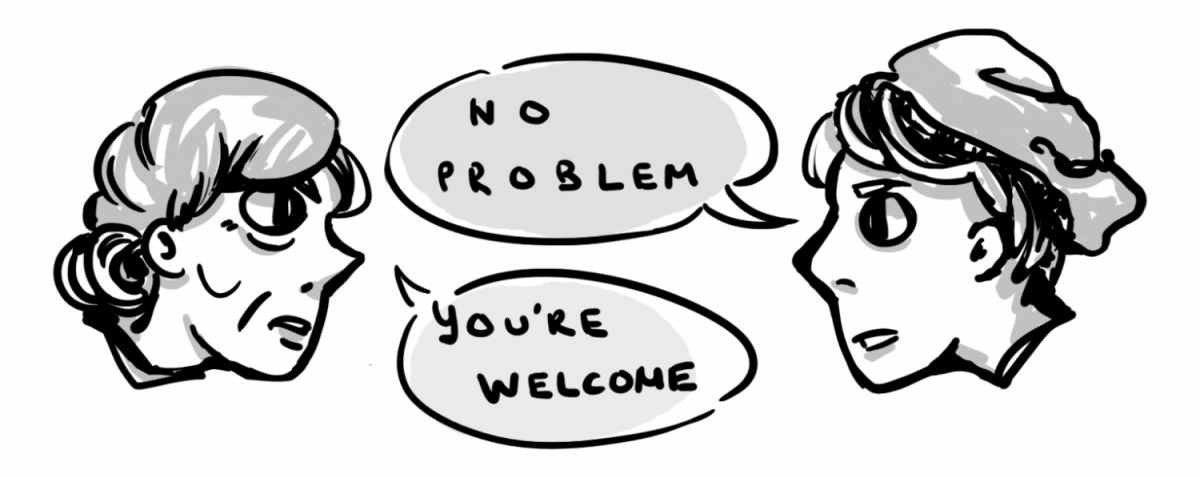The “No Problem” Problem
September 28, 2017
“When did everyone born after 1980 decide that ‘No problem’ was interchangeable with ‘You’re welcome’? Who spread that virus? The Taliban?”
In an article by CBS contributor Bill Flanagan, he begins his attack on the phrase “no problem” with this inflammatory statement. He continues to berate millennials who, by saying “no problem,” seem to imply that assisting another person was a problem.
Flanagan shares the sentiments of many other Generation X members and older, persisting that “you’re welcome” is the only proper response to “thank you.” Their distaste takes the form of rebuking people who reply “no problem” or cutting back on a service tip.
The majority of millennials, without knowledge of this distaste, prefer “no problem” as a less formal — but no less polite — version of “you’re welcome,” according to a study conducted by students at the University of Toronto.
Antagonistic feelings between younger and older generations have always existed. But why exacerbate these feelings through a simple miscommunication that could be easily remedied? To resolve this generational discourse, the first step is to learn why this misunderstanding exists in the first place.
Both “you’re welcome” and “no problem” are examples of phatic expressions: they’re not meant to be literally interpreted but rather serve a communicative intent. Another example of a phatic expression is “What’s up?” Replying “I’m good, how are you?” only makes sense knowing the phatic expression is not meant to be interpreted literally — rather, it asks about a person’s well-being.
The miscommunication arises from how “no problem” often functions as a phatic expression for millennials, but not older generations. Older generations focus on the negative connotations of the words “no” and “problem,” while millennials see the phrase as a way to avoid making the exchange about themselves.
The issue many millennials have with the phrase “you’re welcome” is the expectation that “thank you” preceded. This means the person completing the request felt they deserved the thanks.
This expectation shifts the focus of the thanks away from the task at hand, and focuses on how the person thanking them fulfilled their role. This condescending acknowledgement of role execution lends “you’re welcome” its sarcastic edge.
Rather than force people to change their perceptions entirely, finding alternative responses to “no problem” and “you’re welcome” may be more feasible. “Any time” is one phrase that could fulfill this role, as it is without negatively connotated words. Alternatively, after being thanked, one could thank the other person in return.
The discourse over “no problem” and “you’re welcome” is just one aspect of miscommunication between generations. Dr. Deborah Tannen, a linguistics professor at Georgetown University, stresses the value of taking the time to understand the communication differences between different groups of people.
“There are many situations where problems arise between people because conversational styles vary with ethnic, regional, age, class and gender differences,” Tannen said. “What can seem offensive to one group isn’t to another. I’ve long believed that if you understand how conversational styles work, you can make adjustments in conversations to get what you want in your relationships.”
Understanding the reasoning behind this miscommunication could be the deciding factor in getting a job; human resources professionals admit to disqualifying applicants for saying “no problem,” according to Forbes contributor Micah Solomon. It could also help parents connect with their children — no child wishes to be condescended to. And overall, resolving this simple misunderstanding could make the coexistence of millennials and older generations a little less tense.





